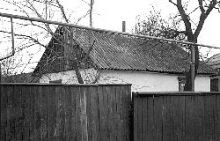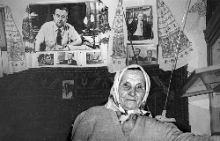Lomivka, the native village of the classicist of Ukrainian literature, Oles Honchar, whose 85th anniversary will soon be celebrated by UNESCO decision, can’t be found on a map. After World War II, it became a part of the Amur- Nizhnedneprovsk district of the city of Dnipropetrovsk. It is surrounded by cottages, dachas, and apartment houses. In many other respects, the village remains the way it used to be: squat houses, fences, and narrow curved streets. On one such street, Klubna, the writer’s sister, 89 year-old Oleksandra Terentiyivna Sova, lives.
“Our family lived in Lomivka since times immemorial,” narrates Ms. Sova. “Here, in the local cemetery, our ancestors on my father’s side and our parents are buried.” Their father, Terenty Sydorovych Belychenko, was born in 1890. At thirteen, he became an orphan after the death of his mother. The family sent him to the city to work in a store. Before World War I, he made his career as a shop assistant. There he met his future wife, Tetiana Havrylivna Honchar, who came from Poltava oblast together with her parents. His life was hard, and he had seen many sorrows. The masters whipped him for even the smallest mistake. All he was given to eat were herring heads and the water in which varenyky were boiled. When the writer’s parents got married, they moved to Lomivka to stay with their relatives. “Here I was born on April 4, 1914, in a small house in Petrozavodska street, and Oles on April 3, 1918, when our father came back from war,” says Oleksandra Terentiyivna. The house still exists. Its new owners have covered it with bricks and replaced the straw roof with one of slate, but it is still recognizable. On Christmas Eve of 1920, Honchar’s mother died. Her relatives took little Oles with them to the village of Sukha in Poltava oblast. Soon his father married again, and Honchar’s sister had to nurse children born in this new marriage. “My stepmother was a wicked woman — maybe because of her hard life,” she recalls. “I didn’t go to school even one day. When my father tried to say that I should go there, she said, then you hire a maid for me. Our life was hard and poor father worked in a local kolhosp, cultivated his land lot, and, in addition, worked at the Komintern factory, carting the coal.” He died in 1941, “because his work killed him.”
Oles was lucky, compared to his sister. As a child, he was a cowboy in Sukha, and later went to school. His grandfather, Havrylo Honchar, and grandmother, Priska, were like second parents to him. Oles’s uncle Yakiv also took care of him. “This is why the teacher at school said, ‘Let you be Honchar,’” Oleksandra Terentiyivna says. And so it happened. In Poltava oblast they believe that the future writer was born in Sukha. All reference books and encyclopedias say so, but, according to the elder sister, “this is not how it was in reality.”
Oles and Oleksandra met only in 1935 when uncle Yakiv brought his nephew to visit his family in Dnipropetrovsk. Soon Honchar went to study in Kharkiv and later was called up for military service during World War II.
After the war, in the fall of 1945, Oles Honchar returned to Dnipropetrovsk. The family celebrated this event and decided that he shouldn’t go to Kharkiv to complete his education. He could do it just as well at Dnipropetrovsk University. “Here he used to sleep,” Oleksandra Terentiyvna says. “We were so poor that instead of a bed there were two sacks full of beans and boards on them. Here he read textbooks at nights, and here he wrote his Standard Bearers . Sometimes he used two carbide lamps in one night.” One such lamp still stands on an old bookshelf filled with signed copies of Oles Honchar’s novels. Next to it, there is a glass with pens and pencils and a deluxe Kobzar edition. Pictures of the writer, his relatives, and parents, decorated with rushnyk embroidered towels, hang on the wall. “My husband was a good master and a nice man,” recalls Oleksandra Terentiyivna. “He insisted that Sashko stays with us. He said, we can always share a plate of soup with you; our house is warm, and your sister can always wash your clothes. All you have to do is study.” This is how Oles lived until 1947, when he left for Kyiv. He came back very cheerful and said that he had become a writer.
Oles Honchar never forgot how his relatives gave him a shelter in the hard times after the war. Having become a laureate and renowned writer, he kept visiting his sister. Oleksandra Terentiyivna recalls one of his visits. On his way back to the railway station, he dropped by to the bank and, coming out of it, gave her an envelope. When she came home and opened it, she found “an enormous sum of money” there. This money laid a basement for a new house they built next to the old one. Their children live there now. Later he gave them more money and helped them to obtain a telephone.
Speaking about her brother’s career in literature, Oleksandra Terentiyivna sounds rather sad, especially when mentioning the period after his Cathedral was published. The Party representatives, especially in Dnipropetrovsk, were unsatisfied. “They were the reason for his death,” believes Ms. Sova, considering that many in the Belychenko and Honchar families almost celebrated their 100th anniversary. However, “everybody has his own fate and his broad way,” she quotes from Taras Shevchenko.
Having learned to read, Oleksandra Terentiyivna has read not only Kobzar and her brother’s books, but also books by Yanovsky, Tychyna, Sosiura, and Dovzhenko. She caringly keeps and rereads Honchar’s letters he sent from the war front. But most often she reads the Gospel. “I go to church every day,” she confesses. The cathedral is next door to her house, and Oleksandra Terentiyivna, having received her pension, often donates her small share to it. “I will survive,” she underscores,” I have a vegetable garden and a dozen chickens.”
In spite of her age, the indefatigable landlady takes care of the historical house herself. Last summer she whitewashed all the walls and washed the rushnyk towels. Meanwhile, there are nice people willing to help “grandma Shura,” as they call her in Lomivka. People’s deputy of Ukraine, Anatoly Klymenko, who grew up next door to her house, brought her a truck full of coal. Later he stepped forward with an initiative to create an Oles Honchar literature memorial complex in Lomivka. There already exists a small museum in the local school No. 115, and Oleksandra Terntiyivna founded an apple-tree orchard next to it. There were suggestions to erect Honchar’s bust or at least a memorial plaque in Lomivka. The locals agree to it and suggested renaming Klubna St. after Honchar. However, city council deputies took a different decision and renamed a street in the city center. However, it is Lomivka where people bring things connected with Honchar’s name. There are rarity photographs, a set of the Literature Newspaper copies of the late 1940s subscribed by Honchar himself, a typewriter, inkstand, and a sopilka flute. The writer’s compatriots believe that in due time a true people’s museum will be created at his birthplace.








